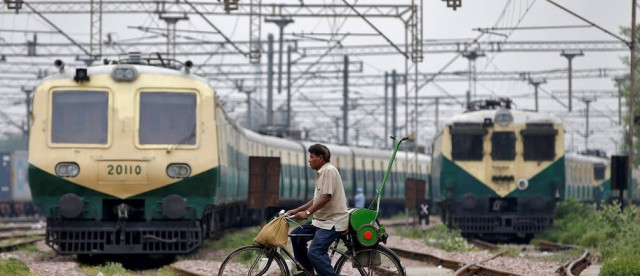KCR slated for revival by January
Coaches required for the rail system will be dispatched to Karachi by next week

The revival of the long-defunct Karachi Circular Railway (KCR) is finally inching towards its final stages of completion. The project, which had been subject to various complications in past years, is expected to be reinstated as early as January 2021, reveals the Ministry of Railways.
The KCR first began its operations in the year 1969, under the administration of Pakistan Railways. Its trains served the Karachi metropolitan area as an affordable means of intra-city transport for thirty years, until the service was eventually discontinued in 1999.
Considering the mega-city’s growing infrastructural and transportation needs, the revival of the circular railway was first brought up in 2005, and then later in 2009. Both times however, the project remained limited to lip-service until 2017, when the federal government offered its first restoration package for the rail network.
After remaining inoperational for over two decades and with a city built upon its sunken tracks, the KCR’s revival now presented a set of unique challenges - the foremost being the 67 acres, out of the required 360, which had been subject to extensive encroachment over the years.
Already delayed by mismanagement on various levels, the clearing of the path for the mass transit system’s construction began in May 2019, as part of the city’s anti-encroachment drive.
A year and a half later, with the project framework finalised, the Carriage Factory Islamabad has been told to expedite work on vehicles issued for the upgradation of KCR.
Out of the 40 coaches and 10 locomotives dedicated to the project, seven coaches and two locomotives are said to be on their final stages of upgradation and due for dispatch to the metropolis by next week.
Restoration strategy
Currently, the KCR project comprises of a 44 kilometre long track, with the inclusion of a 30km loop with 20 stations and a 14km main line with five stations.
According to the Ministry of Railways spokesperson, the project is set to be reinstated in three phases, where the first phase includes the 14km track from Karachi City Station to Orangi Station, the second phase caters to the seven kilometre track running from Orangi Station to Gilani Station and the third phase comprises of the nine kilometre track going from Gilani Station to Drigh Colony.
“Revival work on pertaining to the project’s first phase is going on in full swing, while the 12 kilometre track from Karachi City to Mangophir has been restored completely,” claimed the ministry spokesperson.
According to the spokesperson, tenders worth Rs15 million for the repair of nine stations and platforms and 15 level crossings have been issued for the project’s first phase, whereas Rs5 million for electrical signals and telecommunications were issued in July of the current financial year.
The restoration of the intra-city rail service in its initial phase is expected to come at the cost of Rs1.85 billion. Under the KCR system, a total of 32 trains are slated to provide transport to over 16,000 passengers daily, while the journey time from the first to the last destination will be 30 minutes.
Following its restoration and revival, the Pakistan Railway will upgrade the KCR project in its second phase at an estimated cost of Rs8.7 billion. In this phase, the number of trains will increase from 32 to 48 while the passenger capacity will be increased to 24,000 with the journey duration being shortened to 19 minutes.
Later, in the third and final phase, the project will be upgraded to a modern urban transit system on the basis of a public-private partnership.
Speaking to The Express Tribune, Carriage Factory Islamabad managing director Ghulam Qasim said that the remaining 33 coaches and eight locomotives required for the circular railway are expected to be ready for dispatch by November 2020.
“The coaches manufactured under the KCR project can each accommodate a total of 105 passengers. There is a seating capacity of 64 passengers, while 32 support handles have been installed in every coach for passengers to be able to travel standing up,” he explained.
Published in The Express Tribune, October 6th, 2020.


















COMMENTS
Comments are moderated and generally will be posted if they are on-topic and not abusive.
For more information, please see our Comments FAQ